

Songs of Innocence and Songs of Experience by William Blake - Full Text Free Book. This etext was prepared by David Price, email ccx074@coventry.ac.ukfrom the 1901 R.
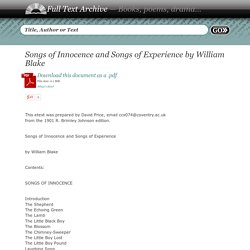
Brimley Johnson edition. Songs of Innocence and Songs of Experience by William Blake Contents: IntroductionThe ShepherdThe Echoing GreenThe LambThe Little Black BoyThe BlossomThe Chimney-SweeperThe Little Boy LostThe Little Boy PoundLaughing SongA Cradle SongThe Divine ImageHoly ThursdayNightSpringNurse's SongInfant JoyA DreamOn Another's Sorrow IntroductionEarth's AnswerThe Clod and the PebbleHoly ThursdayThe Little Girl LostThe Little Girl FoundThe Chimney-SweeperNurse's SongThe Sick RoseThe FlyThe AngelThe TigerMy Pretty Rose-TreeAh, SunflowerThe LilyThe Garden of LoveThe Little VagabondLondonThe Human AbstractInfant SorrowA Poison TreeA Little Boy LostA Little Girl LostA Divine ImageA Cradle SongThe SchoolboyTo TirzahThe Voice of the Ancient Bard Piping down the valleys wild,Piping songs of pleasant glee,On a cloud I saw a child,And he laughing said to me: 'Pipe a song about a Lamb! ' Poems: Three Series, Complete by Emily Dickinson. Part 1 out of 6 Produced by Jim Tinsley by EMILY DICKINSON Edited by two of her friends.
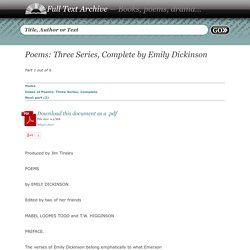
Poems of Coleridge by Coleridge, ed Arthur Symons. Part 1 out of 4 Jonathan Ingram, Jerry Fairbanksand the Online Distributed Proofreading Team To LESBIA (FROM CATULLUS) To ---- In one of Rossetti's invaluable notes on poetry, he tells us that to him"the leading point about Coleridge's work is its human love.
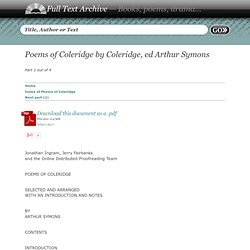
" We mayremember Coleridge's own words: "To be beloved is all I need, And whom I love, I love indeed. " Yet love, though it is the word which he uses of himself, is not reallywhat he himself meant when using it, but rather an affectionate sympathy,in which there seems to have been little element of passion. With this incessant, passionless sensibility, it was not unnatural that histhirst for friendship was stronger than his need of love; that to himfriendship was hardly distinguishable from love. Both for his good and evil, he had never been able to endure emotionwithout either diluting or intensifying it with thought, and with alwaysself-conscious thought. Conrad Aiken, The House of Dust. Part 1 out of 2 This etext was prepared by Judy Boss, Omaha, NE THE HOUSE OF DUSTA Symphony To Jessie.
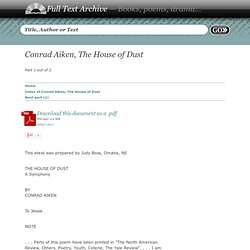
Modern Russian poetry : an anthology. Babette Deutsch - Walt Whitman Builder for America (1941) Exploring "The Waste Land" - The Poem by T.S. Eliot. Brief site description This site is a learning resource allowing exploration of T.S.
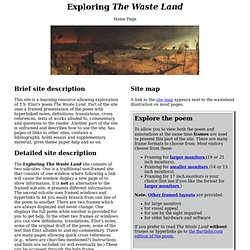
Eliot's poem The Waste Land. Part of the site uses a framed presentation of the poem with hyperlinked notes, definitions, translations, cross references, texts of works alluded to, commentary, and questions to the reader. Another part of the site is unframed and describes how to use the site, has pages of links to other sites, contains a bibliography, holds essays and supplementary material, gives theme paper help and so on. Detailed site description The Exploring The Waste Land site consists of two sub-sites. Exploring and The Waste Land We shall not cease from exploration And the end of all our exploring Will be to arrive where we started And know the place for the first time.
As T.S. "... what branches grow out of this stony rubbish? " More than you might imagine. About the illustration Site map A link to the site map appears next to the wasteland illustration on most pages. Supplementary materials. Matthew Arnold. 1909. The Poems of Matthew Arnold, 1840-1867. Rilke, Duino Elegies. Translated by A.
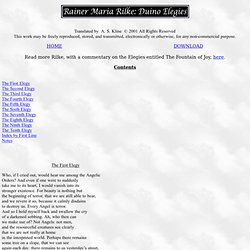
S. Kline © 2001 All Rights Reserved This work may be freely reproduced, stored, and transmitted, electronically or otherwise, for any non-commercial purpose. Read more Rilke, with a commentary on the Elegies entitled The Fountain of Joy, here. Contents The First Elegy. 3 The Second Elegy. 7 The Third Elegy. 11 The Fourth Elegy. 15 The Fifth Elegy. 19 The Sixth Elegy. 24 The Seventh Elegy. 26 The Eighth Elegy. 30 The Ninth Elegy. 34 The Tenth Elegy. 38 Index by First Line. 44 Notes. 45 The First Elegy Who, if I cried out, would hear me among the Angelic Orders? Take me to its heart, I would vanish into its. 608. To a Skylark. Percy Bysshe Shelley. The Oxford Book of English Verse. A una alondra - Percy Bysshe Shelley. ¡Sé bienvenido, jubiloso espíritu!
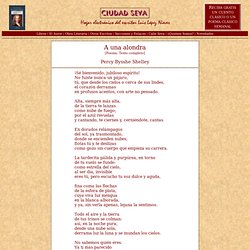
No fuiste nunca un pájaro, tú, que desde los cielos o cerca de sus lindes, el corazón derramas en profusos acentos, con arte no pensado. Alta, siempre más alta, de la tierra te lanzas como nube de fuego; por el azul revuelas y cantando, te ciernes y, cerniéndote, cantas. En dorados relámpagos del sol, ya trasmontado, donde se encienden nubes, flotas tú y te deslizas como gozo sin cuerpo que empieza su carrera. La tardecita pálida y purpúrea, en torno de tu vuelo se funde: como estrella del cielo, al ser día, invisible eres tú, pero escucho tu voz dulce y aguda,